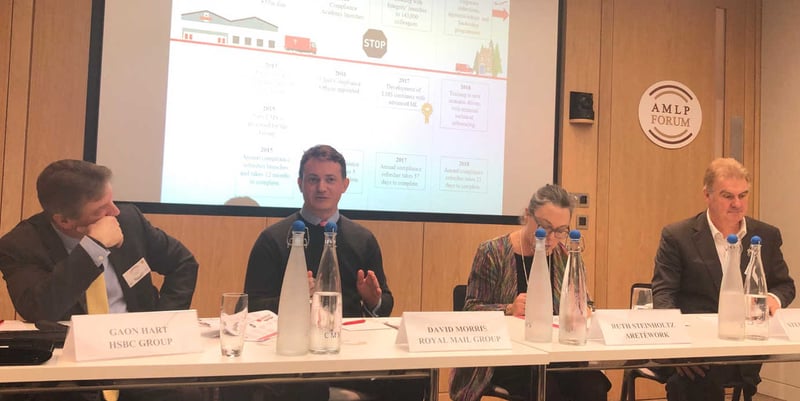The Foreign Corrupt Practices Act and the UK Bribery Act 2010 threaten severe penalties. However, a statistic from Transparency International UK shows that the international cost of corruption amounts to a staggering $3.6 trillion annually.
Bribery & corruption offences & how to spot them
A Global Fraud and Risk Report revealed that the biggest threat related to bribery and corruption in the UK comes from a lack of visibility over third parties, with a further 24% of the threat stemming from employees' actions.
So how can companies prevent bribery and corruption in their business, especially involving third parties and employees? Top of your list should be spotting warning signs that suggest that bribery and corruption could be taking place.
1. Unnecessary or inappropriate purchases
Corrupt payments can sometimes be concealed as bona fide expenditures. If an employee purchases unnecessary or inappropriate items from a supplier or contractor with no obvious business need, this could indicate a potentially corrupt relationship.
Watch out for frequent low-level orders or purchases of large quantities, particularly if there is no visible need for such items or those goods never seem to materialise.
2. Questionable invoices
Corrupt payments and bribes may be concealed in invoices. For example, invoices may be submitted without any actual work being done and no supporting documentation, haemorrhaging funds away from the business. Invoices may also conceal corrupt payments, which appear as extra fees, expenses or charges.
Look out for over-inflated invoices or invoices that cannot be matched to any discernible output. Alarm bells should ring if fees, commissions or expenses are listed without supporting documentation. Always look for a pattern of questionable invoices, as this can indicate that the invoices are being used to fund bribe payments.
3. Continued acceptance of poorer quality
If an employee continues to work with or accept sub-standard goods or services despite complaints, this could be a strong indicator of possible corruption.
You'll need to consider whether they may be getting a kickback from the supplier or contractor for continued business.
4. Conflicts of interest
The risk of bribery and corruption can increase with close connections or links between an employee and a supplier or contractor. At worst, nepotism and cronyism can cloud your judgement and lead to bad decisions which are not in the company's best interests. At best, this can give a perception of corruption.
Consider whether an employee has a personal or economic interest in a particular transaction or appointment. What is their personal relationship with them? Are there close links? Does their behaviour change when certain suppliers are mentioned? Are they acting differently or suspiciously? Is there an insistence that they alone deal with a certain supplier? All this could indicate a conflict of interest.
5. Unqualified third parties
Bribery and corruption can occur via intermediaries and agents, who may appear to do no more than facilitate the deal.
Be suspicious if the third party your company is dealing with seems unqualified for the job they are contracted to perform, if they have no track record in the industry in which they operate if they lack facilities or resources required to perform the work, if they come highly recommended by a foreign public official and seem able to bypass legal or bureaucratic hurdles effortlessly.
6. Incomplete travel & expenses
Bribes and corrupt payments may be concealed as travel expenses or hospitality. Expenses should only be reimbursed for legitimate business expenditure, backed up with supporting documentation.
Look out for travel and expense forms with missing receipts or that don't add up - e.g. a reported trip to a supplier's site that didn't happen. Sharp practices could signify something bigger like internal fraud or business money being used for improper payments.
How to prevent bribery & corruption in your firm
According to PwC's Global Economic Crime Survey, fraud or some type of economic crime has affected 46% of UK companies over the last two years. Among the 19 categories of economic crime, cybercrime stands out and significantly affects all industries.
1. Update anti-bribery & anti-corruption policies
Most UK businesses have adopted anti-bribery policies - but it's how they are implemented that will make a difference.
Ensure staff understand your company's rules and expectations around bribery and corruption. They need to know what is and isn't acceptable concerning gifts, hospitality, donations, sponsorship and political donations. You need to provide regular bribery training to maintain awareness.
Alongside training, establish processes that help them remember the dos and don'ts, such as checklists and travel guidelines.
Staff need to understand that any gift or hospitality they receive must have a legitimate business purpose, be proportionate, and be declared in the company's Gift and Hospitality Register. Be sure to clearly outline what is meant by 'legitimate' and 'proportionate' - don't leave it open to interpretation.
2. Make the policies clear
Staff awareness of anti-bribery policies is only half the story. Creating an anti-bribery culture needs a clear and consistent set of messages coming from the top.
Everyone from the board of directors to the business owner and the compliance function needs to make it clear that they won't tolerate bribery and corruption and that anyone found guilty will face the highest sanctions.
However, the most vital thing is for people at the top to be seen to practice what they preach and believe in the importance of anti-bribery policies. Otherwise, staff won't buy into the culture, and any dialogue around anti-bribery training won't be taken seriously.
3. Embed ABAC principles in corporate culture
Refer to Anti-Bribery and Corruption (ABAC) in company handbooks, reports, and training. Set ground rules upfront by including ABAC clauses in all supplier contracts, along with appropriate termination clauses for suspected breaches.
Effectively communicate to staff how important they are in preventing bribery and empower them to play a role in maintaining compliance - for example, by outlining whistleblowing procedures and red flags to look out for.
4. Conduct due diligence on all third parties
Anti-bribery laws also apply to all your third parties, i.e. any agents, intermediaries, consultants and associates, and anyone else representing you or acting on your company's behalf. You are responsible under the law for thoroughly checking and verifying these parties.
This means implementing adequate systems and controls to ensure third parties are who they claim to be, have the appropriate credentials and are approved at the senior management level. It is also good due diligence to check that all parties, including buyers, suppliers and investors, are not on the sanctions list to ensure you are compliant with sanctions laws.
5. Add precautions for foreign public officials
When dealing with foreign public officials, make it clear that employees must not offer cash or anything of value to a foreign public official or anyone closely related to them, including charities or voluntary organisations run by their spouses.
6. Avoid facilitation payments
Don't make facilitation payments to speed up the performance of a function by a government official unless you are physically threatened.
7. Report bribery & corruption concerns immediately
If staff have witnessed or suspected bribery, they need to know how and to whom to report it. They should be able to speak to their manager or report it via your company's established whistleblowing channels.
It should also be made clear to employees that it's not their job to investigate their concerns. They should leave the investigation to the appropriate channels instead.
Bribery is a significant problem that can result in huge fines for companies and individuals and even imprisonment. Don't let this be a reality for your business.
8. Make anti-bribery training meaningful
Bribery and corruption prevention policies and procedures need to be embedded and understood by everyone in the organisation. This is where a good quality anti-bribery training programme is critical. Training needs to not only help people understand what is and isn't acceptable - it must embed the appropriate behaviours.
With this in mind, it's important that training is first personalised to your company. This means creating bespoke training content that uses your company name, policy names, terminology your company uses and so on.
But most importantly, it's crucial to remember that your staff don't need to know the intricate details of the Bribery Act, clauses and all. Instead, they need to understand the human impact of bribery and their specific responsibilities to help prevent bribery in everyday situations they may come across.
This gives training real meaning, and staff will be much more likely to remember their duties and act in the right way.
Want to learn more about anti-bribery compliance?
We have created a comprehensive bribery & corruption roadmap to help you navigate the compliance landscape, supported by several financial crime prevention courses in our Compliance Essentials Library.
We also have 100+ free compliance training aids, including assessments, best practice guides, checklists, desk aids, eBooks, games, posters, training presentations and even e-learning modules!
Finally, the SkillcastConnect community provides a unique opportunity to network with other compliance professionals in a vendor-free environment, priority access to our free online learning portal and other exclusive benefits.









